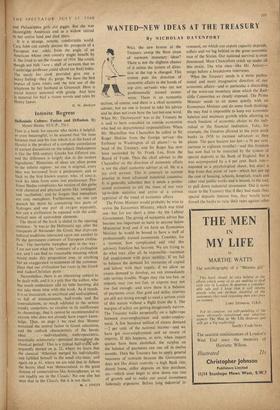Infinite Regress
Hellenistic Culture: Fusion and Diffusion. By Moses Hadas. (O.U.P., 35s.)
Tins is a book for anyone who thinks it helpful, or even meaningful, to be assured that 'the issue between man and his fate which is at the heart of Hamlet is the product of a complete assimilation of ancient discussions on the subject. Shakespeare is like the fifth-century Greeks but different too, and the difference is largely due to the eastern ingredients.' Historians of ideas are often prone to the infinite regress: no one is original, every idea was borrowed from a predecessor, and so back to the first known source, who. of course, took his ideas from some lost predecessor. Pro- fessor Hadas complicates his version of this game with chemical and physical terms like 'amalgam' and 'oscillation,' and he forgets that metaphors are only metaphors. Furthermore, no one can quench his thirst by consuming two parts of hydrogen and one part of oxygen separately, nor can a civilisation be equated with the arith- metical sum of antecedent elements.
The thesis of the book is stated in the opening
sentence: 'It was in the Hellenistic age, after the conquests of Alexander the Great, that disparate cultural traditions interacted upon one another to fix the permanent contours of European civilisa- tion.' The inevitable metaphor gets in the way: I am not sure what the 'contours' of a civilisation are, and I can find no reasonable meaning which would make this proposition true, or anything but an exaggerated re-statement of the common- place that our civilisation has roots in the Greek and Judeo-Christian pasts
Nevertheless, there is an interesting subject to
be dealt with, and it is a pity that the author, who has much enthusiasm and no little learning, did not take more time with this book. As it stands, it is so inaccurate, so uncritical and undisciplined, so full of misstatements, half-truths and flat contradictions, so much addicted to the newest cranky conjecture, so cavalier in its indifference to chronology, that it cannot be recommended to anyone who does not already have expert know- ledge. Thus, on page I we read that 'Homer remained the central factor in Greek education, and the outlook characteristic of the heroic ideal . . . —individualistic, anthropocentric, essentially aristocratic—persisted throughput the classical period.' This is a typical half-UM:sub- sequently denied on p. 22, where we learn that the classical 'Athenian merged his individuality and fulfilled himself in the small city-state,' and again on p. 61, where we are told that in Athens the heroic ideal was 'democratised, to the great distress of conservatives like Aristophanes, as we can readily see in the Clouds.' No one else has seen that in the Clouds, for it is not there.
M. I. FINLEY






































 Previous page
Previous page